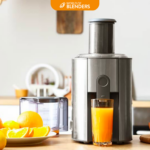This post may contain affiliate links. If you use these links to buy something we may earn a small commission. Thanks.
Glowing skin, improved digestion, boosted immunity, and an abundance of energy – what more could you want? Fresh, homemade juice is a game-changer when it comes to health benefits.
So now you’re wondering, how long does fresh juice last?
Fresh juice can be stored for up to 24 to 72 hours at most but for the most effective health benefits, you should drink it within 20 minutes.
The difference in the hours to last is brought about by the following reasons.
- Type of juicer used
- Fruits and vegetables used to juice
- Oxidation levels
- Storage method
But you’ll soon realize that making and storing juice properly to benefit from the nutritional quality (and avoid bad juice) can be a little more complicated than you might think.
Luckily we’ve got great info for you right here about how long fresh juice lasts in the fridge.
- What Is Oxidation?
- What Affects The Oxidation Rate?
- Do Certain Fruit and Veggies Decrease the Life of Fresh Juice?
- Storing Fresh Juice: Tips & Tricks
- How to Increase the Shelf Life of Fresh Juice at Home
- How Do Juice Manufacturers Make Their Products Last So Long?
- What Foods Should I Avoid Putting in My Fresh Juice?
- How Do You Keep Juice Fresh for a Long Time?
- Common Questions About Storing Fresh Juice
- Final Thoughts
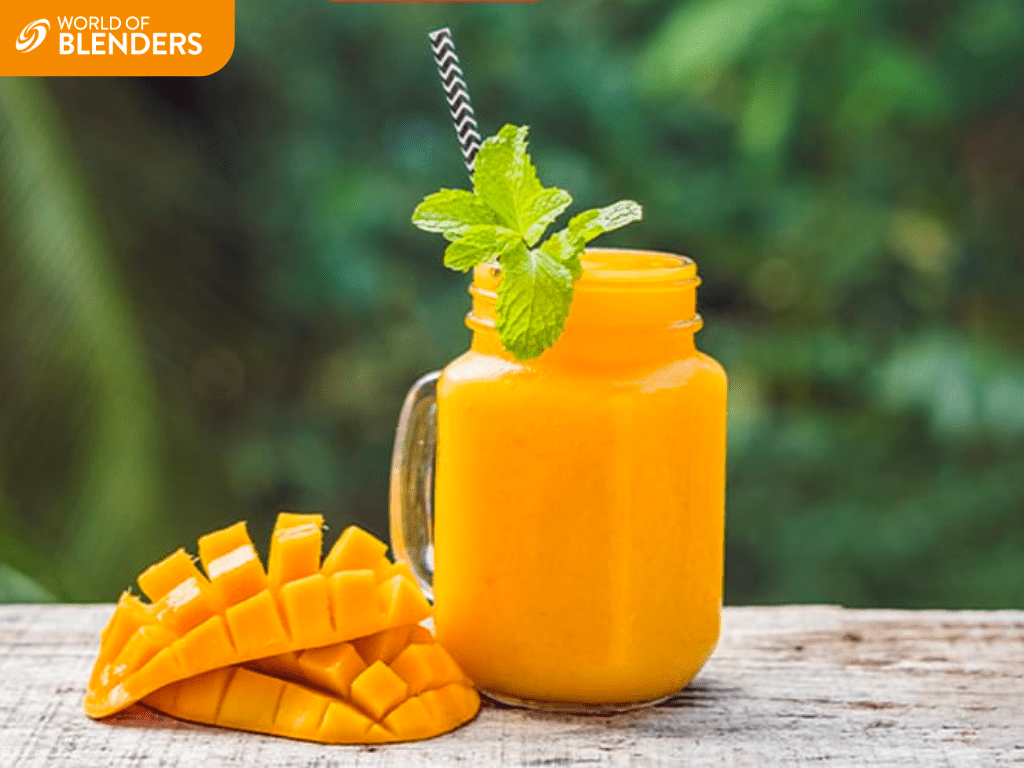
What is Oxidation?
Ever cut up an apple or a banana and noticed how quickly it turns brown if you don’t eat it straight away? The same can happen to fresh juice.
This is called oxidation. Without going too deep into the science, air, light, and heat are oxidation’s best friends, and will greatly reduce your fresh juice’s shelf life.
While oxidized fruit or juice isn’t harmful, it’s less tasty and has fewer nutrients than when it was still fresh.
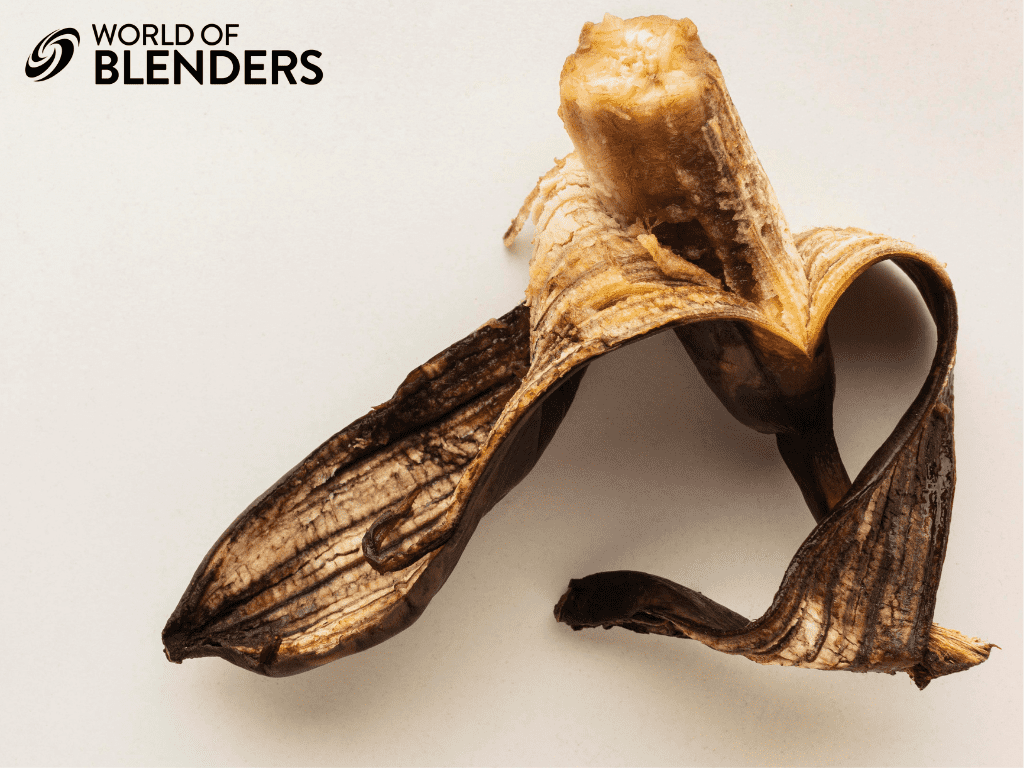
How Does Oxidation Affect Juice Life?
Just like oxidation takes hold of raw, cut-up fruits and veggies, the same can happen to fresh juice if you don’t drink or protect it shortly after juicing.
Oxidized juice not only looks unappealing (from discoloration) but also contains less of those amazing superfood nutrients. It also might not taste as great as it should.
The good news? You can easily reduce or slow the rate of oxidation by storing fresh juice correctly. We’ve got more about that below.
How Long Does Fresh Juice Last Before Oxidizing?
This generally depends on the different types of fresh fruit and vegetables that you use, the type of juicer, and how you store the juice.
But in short, fresh juice is best consumed right away, or within 24 hours of being stored properly in a refrigerator.
What Affects The Oxidation Rate?
The time it takes for fresh juice to oxidize is affected by several different factors such as:
- Type of juicing machine used
- Fruits and vegetables used for juice
- Juice oxidation levels
- Storage method and location.
You’ll want to know how all of them play a role so that you can keep your juice as fresh as possible.
Organic Produce
Did you know that fresh, organic produce has a lower oxidation rate and makes fresh juice last longer?
This is because organic fruits and veggies contain higher levels of nutrients and antioxidants.
And did you know that organic foods are far better for your health? No toxic pesticides, fertilizers, wax, or other chemicals. And they taste better. Organic produce is popular for a reason!
If you have your own veggie garden or fruit trees, you can make the very best (and healthiest) fresh juice!
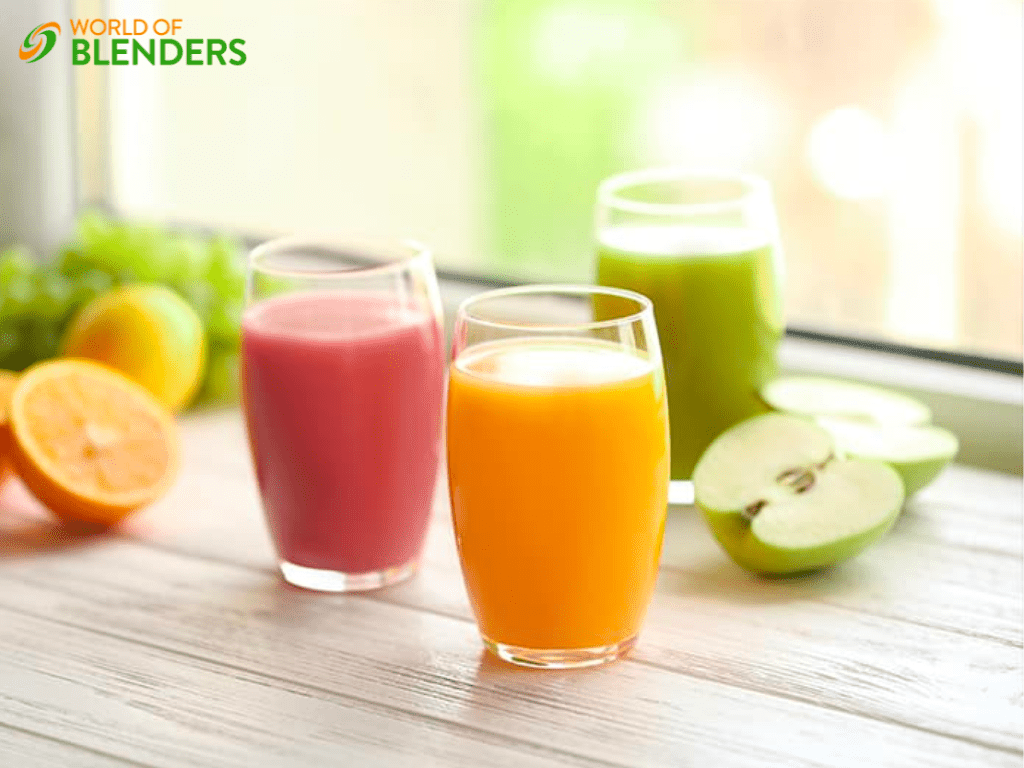
Type of Juicer Used
The type of juicer has a big effect on the rate of oxidation, the shelf life, and the nutritional value of fresh juice.
Let’s take a look at the two most common types of juicers on the market:
Masticating Juicers
Masticating juicers (typically known as cold press juicers, or slow juicers) are the best option.
Why? The juicer crushes the fruits and veggies at a slow pace (80 to 100 rpm) that doesn’t pulverize the fruit as a centrifugal juicer does.
The end result is a higher juice yield with not as much oxidation. The juice stays fresh and nutritious for longer, even if you decide to store it for later.
This juicing method does take more time, but you’ll definitely be rewarded for your patience!
Centrifugal Juicers
These are better suited to those who have very little time to spend in the kitchen.
Unlike a cold press juicer, it runs at high speeds to very quickly separate the juice from the fiber. The high-speed spinning blades dilute the juice and cause higher rates of oxidation (visible in the foam that forms at the top of the glass).
A centrifugal juicer also produces a lower juice yield from the same amount of fresh ingredients.
Top tip: Make the most of your high-speed juicer by drinking the fresh juice immediately to avoid losing nutrients.
Making Juice with a Blender
Can you make fresh juice in a blender? Yes, you can! If you’re in a pinch or you don’t have a juicer, you can blend fruits or vegetables and then strain them through a cheesecloth to make juice.
Just like centrifugal juicers, blenders operate at very high speeds. This obviously means increased oxidation rates (and heat build-up).
You’ll want to drink it right away because storing it will be pointless from a nutritional standpoint.
Storage Method/Location
Were you aware that storing juice in low-quality plastic bottles can cause rapid oxidation?
Always store juice in a proper, airtight glass container, such as a mason jar, to ensure that it stays fresh as long as possible.
Another factor that greatly affects oxidation when it comes to storage is where and when you store your fresh juice.
As mentioned before, drinking the juice straight away is unbeatable. But if you must store it – you want to avoid leaving it sitting out on the kitchen counter for too long.
Bottle it up and put it straight into the fridge or the freezer.
Do Certain Fruit and Veggies Decrease the Life of Fresh Juice?
In general, all fresh juice spoils at the same rate regardless of the specific ingredients used. However, to answer the question accurately, certain fruits and veggies won’t decrease the shelf life of stored juice, however, there are ones that can increase and preserve shelf life naturally.
For example, by adding a little fresh lemon or orange juice, you can keep your homemade juice fresh for longer. This is because citrus acts as a natural preservative which is a perfect thing for your juice. Check out our list of the best oranges for juicing!
It’s also worth mentioning that your own fresh juice will spoil a lot faster than store-bought juice. But although packaged juice may be more convenient, it’s definitely not worth all the artificial preservatives, additives, and sweeteners.
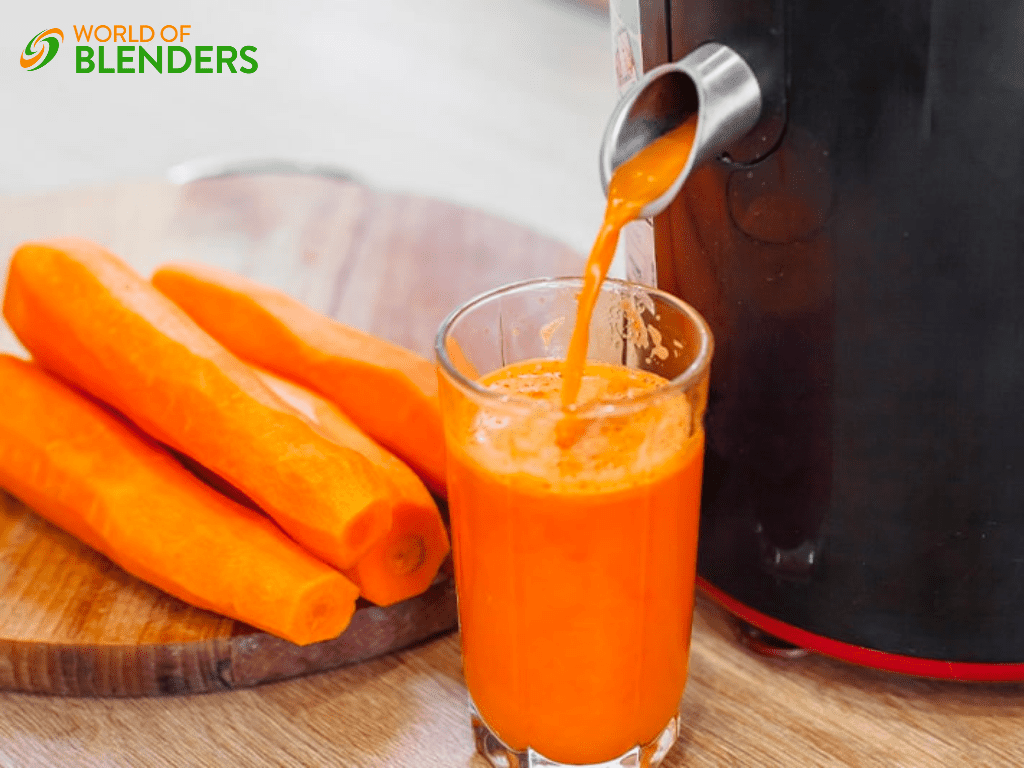
Storing Fresh Juice: 3 Tips & Tricks
1. Refrigerate
You can safely store fresh juice in the fridge for 24 to 48 hours, depending on the type of juicer you use. The ideal fridge temperature is around 35F – 38F (1.5C – 3.5C).
And as mentioned previously, juice from masticating juicers lasts longer than juice from centrifugal juicers.
If you use a high-speed juicer and you’ve got leftover juice, it’s better to store it in the freezer to preserve the nutrients and prevent it from spoiling quickly. (We’ve got more frozen fresh juice tips below.)
2. Use a mason jar
When it comes to your health, glass containers are by far superior when compared to plastic ones.
If you’re drinking fresh juice to avoid the toxins that often come with store-bought juice, you’ll definitely want to avoid the toxins of low-quality plastics too. Since juice is acidic, it’s highly likely to leach potentially harmful chemicals out of plastic.
On the other hand, this is not the case with glass bottles. So store your juice in mason jars in the refrigerator. But why a mason jar specifically?
Mason jars have a rubber seal to tighten the lid and keep oxygen out. This will reduce oxidation and make it last longer. As long as your storage container is airtight, you’re good to go!
Other suitable containers include stainless steel bottles and insulated thermal containers, which are great for traveling.
3. Use the freezer
Got an abundance of fresh produce that you need to use up quickly? Making delicious fresh juice out of it sounds like the perfect solution – but will you really be able to drink it all before it spoils?
Luckily, freezing is an excellent way to store juice as it can last for up to 6 months. However, when you freeze fresh juice, it is best to consume it within 3 months because if you leave it for longer, it loses most of its nutrients. This will ultimately defeat the point of juicing in the first place.
It’s also important to leave some space at the top of the storage containers to allow for the juice to expand when it freezes (just like water does) and avoid it bursting open.
Fun freezer hack: Use silicone ice cube trays to freeze your excess fresh juice into juice cubes. You can add these into your smoothies for a boost of extra nutrients or put them in your water on hot summer days for a healthy refreshment.
When defrosting frozen juice, you might notice it tastes a little strange. The solution is to give the defrosted juice a good stir or a shake.
How to Increase the Shelf Life of Fresh Juice at Home
Besides using the proper storage containers and storage methods to preserve your juice for longer, is there another way to increase shelf life?
Vacuum sealing
Doing this extra step before you store juice is really worth the effort!
Vacuum sealing removes oxygen (goodbye oxidation), prevents bad bacteria from forming, and preserves those powerful antioxidants and nutrients in your fresh juice. In other words, this means fresh juice for longer.
More helpful juice storage tips:
- Don’t open the juice container frequently. This will allow oxygen in and nutrients out.
- A way to avoid this issue is to store juice in single-serve bottles so that you only open it once when you’re going to drink it.
- Dry out all your glass bottles a few hours before you pour the juice into them. This will get rid of any potential bacteria and keep the juice even fresher.
- It’s always better to fill the container with juice to the brim (unless you’re freezing it). This way, it leaves less space for oxygen, meaning reduced oxidation.
How Do Juice Manufacturers Make Their Products Last So Long?
Unlike natural homemade juices, store-bought juices seem to last forever. Yes, preservatives are often added, but the actual commercial juicing process increases the juice shelf life dramatically.
Commercial juice manufacturers use the following methods to make their products last.
UV treatment
Did you know that many major juice brands use UV light rays to pasteurize fruit juice? This gets rid of any bacteria and microorganisms, resulting in a much longer shelf life.
The UV treatment process doesn’t produce any heat. In turn, this prevents any changes to the nutritional value and quality of the juice.
High-pressure processing
If you have ever bought a popular brand of cold-pressed juice, there’s a high chance it’s gone through HPP (high-pressure processing).
HPP claims to extend the shelf life of juice by up to 45 days, and it kills at least 99.99% of microorganisms at the same time. You’re probably wondering, how does it do that?!
This process doesn’t happen in the juicing stage, but rather after the juice has been packaged. The bottles of juice are placed in cold water, and a MASSIVE amount of pressure (up to 85,000 PSI) is applied using an HPP machine.
This process kills microbial content and furthers the juice’s expiry date significantly, all within a matter of a few minutes.
Pulsed electric field
PEF processing has recently become more popular. It’s another innovative way that commercial juice brands preserve their juice for longer without compromising the freshness or quality.
It has proven to increase juice life from 6 to 21 days.
How does it work? Simply put, it uses short, high-voltage electrical pulses to disintegrate the cell membranes of unwanted microorganisms and make them inactive.
What Foods Should I Avoid Putting in My Fresh Juice?
There’s nothing better than getting a rainbow of fresh fruits and vegetables into your diet.
It’s normal for those new to juicing to want to throw everything and anything that came from a plant into the juicing machine. This is great, but you may want to avoid using the following foods on this list!
- Avocados, Bananas – They don’t have much juice – rather blend these fruits to make a creamy smoothie.
- Whole Apples – Apple seeds contain amygdalin, which can be toxic. Apples are a great ingredient in fresh juice – just make sure to cut out the core with the seeds first!
- Broccoli, Cauliflower, Cabbage – Although these cruciferous veggies are ultra-healthy, juicing them makes it difficult for most people to digest. They may cause bloating, cramps or gas.
- Coconut Flesh – The white flesh doesn’t contain enough juice, but coconut water can be a great addition to your fresh juice!
- Kale, Spinach – Only avoid these if you’re prone to kidney stones. Otherwise, they are safe to juice and packed with vitamins, minerals, and fiber.
- Unpeeled Citrus – Orange, lemon, and lime rinds can upset your digestive system. Always remove the peels before you juice them.
- Rhubarb – This tough veggie can damage your juicer, and too much can upset your gut. And remember that rhubarb leaves are poisonous!
How Do You Keep Juice Fresh for a Long Time?
It’s definitely possible to keep your juice fresher for longer without using a fancy machine such as a vacuum sealer. A great trick is to change your juice recipe slightly.
Here are some simple hacks:
- Use fresh, clean fruits and veggies for juicing – If you use fresh produce that is about to spoil or has been pre-cut days (or even hours) in advance, it will reduce the shelf life greatly.
- Add citrus fruits like oranges, lemons, or limes – They contain citric acid, which acts as a natural preservative and increases the juice shelf life. Plus, they taste delicious!
Read more: Prune Juice vs Plum Juice
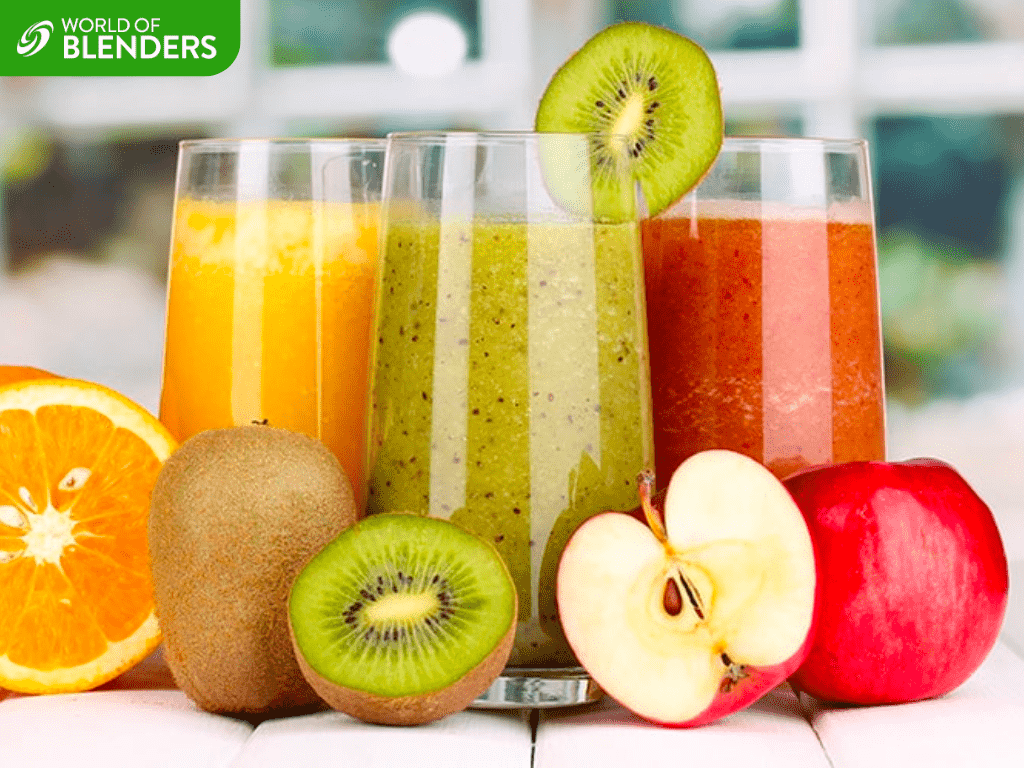
Common Questions About Storing Fresh Juice
Properly stored juice can be kept for between 24-48 hours. This means refrigerating it straight away, and in a suitable container. However, as discussed above, the sooner you drink it, the better!
Mason jars are better for storage of juice than plastic bottles because glass does not contain toxins like low quality plastics can. Juice is often acidic, which makes it much more likely to leach those potential toxins out of the plastic. Glass is not subject to this leaching like plastic can be.
Juice can last up to two days in a Mason jar or any other glass containers. This is because the Mason jar has a rubber seal to tighten the lid and keep out oxygen. You have to put the Mason jar inside the fridge to last longer.
This is another alternative that can prolong the shelf life of the juice. Placing fresh juice in a freezer immediately after juicing can last up to six months but some nutrients will be lost in the process. Keeping the juice for 3 months is viable to enjoy the nutrients in the juice. You have to defrost the juice before storing it in the freezer. If you have plenty of fruit and you don’t want them to go to waste, this is the perfect solution. Freezing the juice will extend the shelf life for you.
Fresh, homemade juice has a range of potential health benefits at any time of day. However, the nutrients are better absorbed on an empty stomach, meaning you may find it more beneficial to drink your juice in the morning.
The most obvious sign that the juice has spoilt is the smell. A potent, sour, or fermented smell is your cue to throw it in the compost heap! Another telltale sign is a change of color. If the fresh juice has gone brown, it means it has oxidized, and there’s a high chance the juice has gone rancid. An increase of ‘bad’ bacterias the reason why fruits and vegetables go rotten. A simple way to minimize bad bacteria is to make sure you wash all of your fresh produce thoroughly before using it. This will help your juice to last longer.
Yes, you can safely store fresh juice for a day or longer if you follow our storage tips mentioned above. If you want to get the most nutrients out of the fruits and veggies, drinking fresh juice immediately is always the most effective. Of course, this isn’t always possible or realistic if you have a busy schedule. You can make your juice the night before and still preserve some of the nutritional value by storing fresh juice in an airtight, glass container in the fridge.
Final Thoughts
Drinking fresh juice daily is a killer health hack. From increasing energy and enhancing weight loss to anti-aging and immune-boosting properties, homemade juice is a winner!
As discussed above, if you drink fresh juice immediately, you are taking full advantage of all the powerful nutrients and essential antioxidants. And what could be more refreshing than enjoying juice fresh out of the juicer?
If you absolutely need to store it, you now know the best tips and tricks to keep it as fresh as can be – such as using the correct containers and storage methods.
Let’s get juicing! Your body will thank you.
